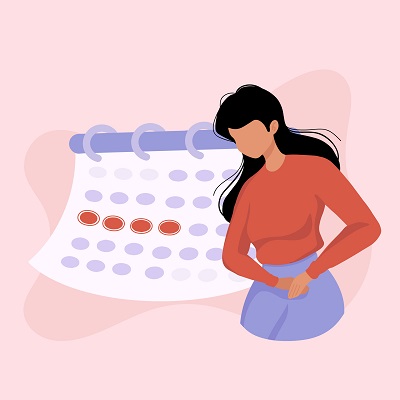Menstruation Matters for Mood. Period. Or does it?
Menstruation Matters for Mood. Period. Or does it?

“You must be on your period.” “You’re just being hormonal.”
Many of us have heard a variation of these sentences in popular media or perhaps even in your own social circles. Such statements are frequently made about menstruation (i.e., periods) and ovarian hormones to explain why negative emotional experiences, such as anxiety and low mood/depression, are being expressed. In this context, hormones are used as shorthand for negative experiences.
For example, if one googles the word “hormone”, the first result includes the following example: “She told herself she was suffering from hormones, that she would cheer up soon.” This sentence highlights many of the misconceptions about ovarian hormones across the menstrual cycle – that they are a woman-specific experience and that they cause “suffering.” The truth is much more nuanced. Billions of people around the world, some of whom do not identify as women, will experience menstrual cycles. For some, the menstrual cycle may influence emotional experience, but for many others, it does not.
The menstrual cycle is characterized by distinct changes in ovarian hormone levels, namely estrogen and progesterone. Emerging work suggests that ovarian hormones play a role in anxiety, depression, and trauma-related symptoms. However, their effects are quite complex. That is, ovarian hormones do not always have negative consequences for mood and in some cases may actually have positive outcomes. For instance, estrogen is thought to have mostly beneficial effects on anxiety, depression, and trauma-related conditions. Some work suggests that high levels of estrogen may boost treatment effects for anxiety disorders. Moreover, progesterone might influence mood regulatory steroids that also lead to beneficial effects on mood. Importantly, however, these general effects may not be the same for all individuals who menstruate, and there is no strong evidence that the menstrual cycle relates to severe mood changes.
For a subset of people, however, progesterone might be linked to severe changes in mood. Right before menstruation, progesterone levels rise and fall. This change in progesterone levels is thought to lead to changes in a range of symptoms such that some people may meet criteria for premenstrual dysphoric disorder (PMDD). The most critical piece of this diagnosis is not the experience of anxiety and depression, specifically, but the timing of the mood changes that occur before menstruation. Others diagnosed with anxiety or depression-related conditions might also experience an increase in their symptoms during specific phases of the cycle. Depending on one’s stage in life (e.g., puberty, pregnancy, menopause) or whether they are taking “synthetic” hormones (e.g., hormonal contraceptives or hormone therapy), the hormonal landscape might also change, which could lead to a difference in how hormones are involved in physiology and mood.
As you can see, the role of hormones in mood is not as straightforward as some might think, and yet, hormones continue to be misunderstood. The negative reputation of ovarian hormones for mood likely comes from a long and harmful history of negative stereotypes about women. The menstrual cycle served as a biological “cause” to link socially held beliefs about female emotionality and presumed changes in abilities. What is often missing from these discussions is that the menstrual cycle itself can be linked to social stressors that are not due to hormones at all, including gender-based stigma, period poverty, and challenges accessing adequate medical care (e.g., access to birth control, gender-affirming medical care.). Therefore, for some, the menstrual cycle may matter for mood, but it may not solely be due to hormone levels.
You might be wondering what this means for you. If you are curious about whether changes in your mood are linked to the timing of your menstrual cycle, we recommend tracking your mood across your cycle. It is important to track the timing of your cycle (with the first day of menstruation being the first day of the cycle) and changes in mood, both what you perceive to be positive or negative changes. Over a few months of tracking, you might start to notice patterns that can increase your own awareness about whether certain times of your cycle are linked to your mood. Further, talking about your cycle with a provider (medical doctor or psychologist) might also help you with evidence-based interventions to diagnose and manage symptoms. Finally, be critical about what you read or hear regarding the links between the menstrual cycle and mood because the association seems to be influenced by many factors that are still being understood by researchers. By tracking your own mood and cycle, you can learn more about what is true for you.
This blog post is sponsored by the the ADAA Women’s Mental Health Special Interest Group.


















